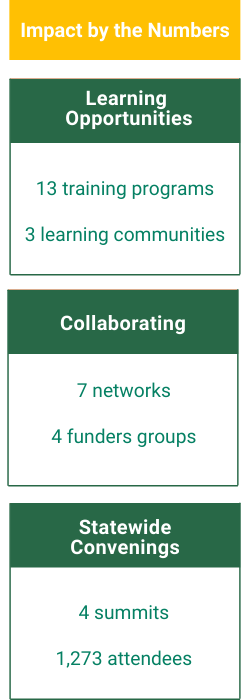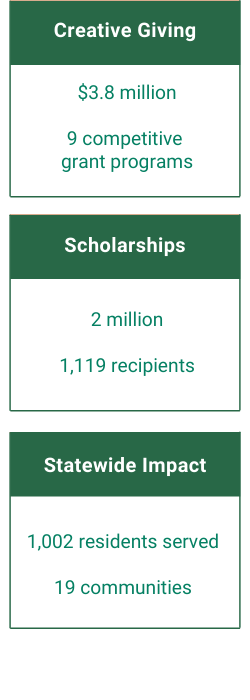2016 Strategic Plan
How we got here and what we’re doing
In 2016, the Maine Community Foundation conducted community conversations around the state asking two fundamental questions: What can we do to improve the quality of life for Maine people? How can we work with our partners and communities to do it?
In talking to those partners – donors, nonprofits, institutions, and other community members – one key theme emerged: We needed to address the barriers that prevent all Maine people from fully engaging in, and contributing to, Maine communities and the Maine economy.
Through these conversations, we identified five key issue areas where MaineCF could make a measurable difference. Over the last few years, we invested in these five fields in varying ways, all with the goal of strengthening the fields, connecting the partners in them, and reducing the barriers that are keeping Mainers from reaching their full quality of life.
The Five Fields
A Strong Start

Our vision: All Maine children receive a healthy start and arrive at kindergarten developmentally prepared to succeed in school and life.
What we learned: Experiences in the first years of life can impact a child’s chance to reach her or his full potential. Unfortunately, these needed experiences are fragmented among nonprofits, businesses, community organizations, and state agencies. It’s clear what resources children need to thrive, but families were often not able to access those resources and communities. The early childhood field lacked a common vision and coordination.
What we did: By combining investments in community planning and infrastructure with state-level advocacy and conversations, we were able help bring more people and organizations into the early childhood sphere and develop a common blueprint. Engaging communities in actively assessing their early childhood environment and needs and then funding the next steps helped build local resources—critical resources when the COVID-19 pandemic hit. Advocacy and policy work helped improve the statewide infrastructure and change the public perception about early childhood education.
Access to Education

Our vision: All Maine people, including adult learners and other nontraditional students, can complete a degree or certificate program to maximize their potential.
What we learned: In Maine, a growing gap exists between the skills employers need and the skills workers have. Too many residents work below their potential. Increasing the educational attainment level of working-age Mainers is critical. However, the educational system is not designed to support adults who want to continue their education. The higher education field was not united in its vision for these students, student support services were disconnected, and funding for returning adults was limited.
What we did: Statewide conversations about the importance of supporting adult college students forged connections across systems. Working with partners across the education and workforce spectrum led to real changes in how the system is working for adults. Better training for those who advise adults returning to college improved supports—and connected these Navigators across systems. Scholarship funding helped close the gap for those going back to school.
Racial Equity
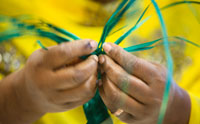
Our vision: All people in Maine have access to opportunities and life outcomes that are not determined or predictable in any way by race or ethnicity.
What we learned: More than 100,000 people living in Maine identify themselves as other than white and they are a growing, important and vital resource for Maine. Organizations serving these populations were under-resourced, and leaders weren’t connected to statewide resources. There were few white leaders in Maine thinking about their role in promoting racial equity or equipped with tools and knowledge to make change.
What we did: Investing in professional development for leaders of color built skills and networks. Working deeply with white leaders on the importance of racial equity and how they can make change in their lives and organizations started transformations. MaineCF walked our talk with our own racial equity assessment and work.
Thriving Older People
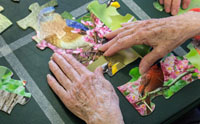
Our vision: All older people in Maine are valued and able to thrive and age in their workplaces and communities with health, independence, and dignity.
What we learned: Many Mainers are living longer and healthier lives, and most of us want to continue to live in our homes and communities as we grow older. But ageism was rife in the state and organizations serving this population were not collaborating or coordinating strategies. Communities didn’t have the tools they needed to support aging in place.
What we did: Funding Reframing Aging work helped organizations across the state to message their work in the aging sphere more positively, changing the perception of what it means to grow older. Community efforts to be more supportive—through grants and the work of fellows—had concrete impacts in people’s lives and helped power changes to make communities truly “lifelong” places.
Innovation and Entrepreneurship
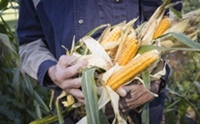
Our vision: All entrepreneurs and innovators in Maine have the opportunity to bring their big ideas to life.
What we learned: Maine is historically a place of innovation, but there was not broad understanding of the best strategies to support entrepreneurial and economic growth. Regions did not have best practices to support the business owners in their communities. A lack of broadband infrastructure was hampering efforts, especially as the pandemic forced more people into remote work.
What we did: Community and regional entrepreneurship trainings and networks helped strengthen resources and connect businesses. Advocacy for broadband combined with community planning funding and brought the issue to the highest levels. Funding directly to entrepreneurial incubators further pushed good ideas closer to becoming strong businesses.
Opportunity to Support This Work
If you are interested in having a more in-depth conversation about any of this work, please reach out to your MaineCF staff contact or Jennifer Richard, senior director of gift planning.
